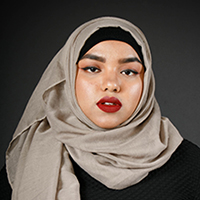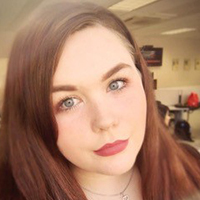
Sadiah Rahman
Specialist: Journalism
Minor: Media Studies
What factors contributed to you choosing your program(s)?
I’ve always been a creative individual. I grew up devouring novels and dreaming of becoming a writer. I never really took it seriously though. It was my dream as a child. But when it came to choosing my program, I was lost. I have a great passion in care and wanted to pursue social work. I applied to social work programs at different universities and the journalism program at UTSC. Eventually my decision came down to UTSC by chance, I literally flipped a coin and had no idea what to expect. I did know that I love writing, expressing myself and sharing ideas and that UTSC would help me do this effectively. I was also really keen on current events, so this program fit me. I was attracted to UTSC’s program because not only is it a specialist program, it’s also a joint program and has internships available. I knew this program would prepare me for my professional life.
Can you describe your program(s)? What is it actually like?
This program is tough. But that’s the nature of journalism and I love that the program doesn’t ignore it. The courses you take at UTSC are drastically different from the one’s you’ll take at Centennial. The university part turns you into a critical thinker, an analyst and a reader. You then take these skills and start your three-semester journey at college and your whole world is different. At Centennial you are technically a student, but you’re treated as journalist. This means you are always pitching, collaborating and chasing stories. The program also helps you find an internship within your preferred field of journalism, be it music, politics or fashion. Something admirable about this program is that it's being updated as you read this (since journalism is always changing.) As a student you learn industry tricks and tools from your professors and a wide variety of guest speakers. Being a part of this program has taught me how to be an effective leader, communicator, networker and collaborator.
What tips/advice can you provide to students just starting or considering this program(s)?
- Manage your time and work hard. This is a demanding field and news doesn’t sleep, nor should journalists. When you begin your college part of this program, the scheduling really takes a toll on your personal life. As a young journalist, your schedule is dependent on your sources (that you’ll need for your stories) so you’ll always be juggling your time and theirs. It’s easy to prioritize your time before your sources, but doing so only puts of your work. Working part-time is possible but will be strenuous especially when you’re at Centennial. If you want to be successful in this program, manage your time, believe in your ability to produce quality content, work with your peers, editors and professors to create a seamless journey.
- Network. A great aspect of this program is that your professors will email you about conferences, talks and guest speakers. It’s your job to show up, make an impression and then build a professional relationship with these people (odds are they will be the ones providing you with job opportunities post-graduation.) Starting from your first year, put yourself out there. Get to know industry professionals, your professors and your peers. Build a strong foundation of people who see and value your talent as a young journalist.
- Use UTSC and Centennial resources. UTSC has creative spaces such as The Underground and the Hub, whilst Centennial has production studios (radio, photo and TV). Use these as much as you can to work on personal projects and/or aid your school ones. What you produce in your years as an undergraduate student will shape your career.
What will you do with your degree after graduation?
In my third year of this program I bought my first DSLR and since then have been really invested in photo and video journalism. One thing I really love about this program is that every student has the opportunity to explore their own interests and I have this program to thank for my passion in photo and video journalism. I am currently talking to my professors about potential media outlets to work with. Upon graduation, I plan on implementing all my storytelling and people skills with a focus on photo and video at a suited outlet.
What has your academic journey during your time been like as you progress toward graduation?
Within the first academic year, the program focuses on reading and writing skills with an introductory approach on media and journalism. Strong reading and writing skills serve as an asset during this period, along with reading the news (this is journalism after all.) Students are also encouraged to start networking and find their field of interest. In second year, students delve more into critical theory and thinking. This is a pivotal period for young journalists, as it builds your journalistic curiosity. Third year is usually when students move over to Centennial (given they have all the prerequisites). At Centennial, you learn how to report and interview and create multi-platform products. Then you report, produce, create and collaborate. You work in photography, interactive journalism and radio. In your fourth year, you spend one semester at Centennial where you take everything you’ve learnt up until that point and create a magazine, a documentary and website along with learning TV news and everyday reporting (and that’s just the first semester). In second semester you head on back to UTSC to finish up your credits. Despite this program being a specialist program, as of now there isn’t a sufficient amount of C and D level courses in journalism, so students are expected to resort to a minor to fulfill those requirements throughout their undergraduate.

Chelsea Ward
Specialist: JournalismMinor: Anthropology
What factors contributed to you choosing your program(s)?
I didn’t know that I wanted to be a journalist until I was accepted to the program at UTSC. Before that, my passion was filmmaking. I was finding myself really inspired by the many VICE documentaries that were coming out on YouTube at the time. My plan was to graduate high school and start studying film so that I could begin making my own. However, after I was accepted into the journalism program and reviewed its curriculum, I realized that I wanted to begin my journey at UTSC. I was confident that the specialist program was going to provide me with invaluable critical thinking skills, interview techniques, and the storytelling skill that's needed to grab an audience’s attention.
Can you describe your program(s)? What is it actually like?
It may sound scary, but there’s no hand-holding in this program when you get to college portion. You’re expected to take all of the theory and writing skills that you’ve learned in the first two years of university and immediately start applying them to your professional work at Centennial. The teachers will expect you to act like a trained journalist from the moment you walk into your first class. That may seem daunting to some, but rest assured that the teachers there are doing it out of respect for you. They believe in you and your abilities without a shred of doubt, and they will stop at nothing to continue building you up. Because it is a smaller program, the students can really benefit from a close-knit community of peers and easy access to one-on-one time with professors at UTSC and Centennial. The professors are going to encourage you to hit the ground running and give you a ton of opportunities to build your portfolio with published work. In this program, you don’t have to wait until graduation to start following your dreams.
What tips/advice can you provide to students just starting or considering this program(s)?
- Accept every story pitch that you can. You’ll quickly find that the more stories you take on at Centennial, the more writing credits you’ll receive in the East York and Toronto Observer. It can be strenuous at times, but you’ll be utilizing your time at college wisely by getting the most hands-on experience possible. And after all of the stress and feeling like you’ll never want to write again for the rest of your life, when you return to UTSC for your senior courses, you’re going to wish you were back in that newsroom again. So enjoy it while you can, and appreciate it for the opportunity it is.
- Make sure that you understand the requirements of your specialist program early on. Know that the majority of your university credits will be going toward journalism, and the rest can be used for any minor program that you wish. Most students have no issue with this, but there have been some that begin their minor programs too late (like me) and have to stay at UTSC longer than planned to complete their credits. Your time at Centennial will be rigorous and time consuming, leaving little to no time to pursue more C- and D-level courses at UTSC while you’re there. Some pull it off, but most can’t. So make sure that you have a solid plan for your university career early. Drop by the UTSC Academic Advising & Career Centre and meet with a strategist to ensure that all of your requirements will be met in the four years of the program.
What will you do with your degree after graduation? (Future plans?)
I plan to continue pursuing my dream of making documentaries, as well as applying my skills to the field of video journalism. But if there’s one thing that this program has taught me, it’s to never turn down a good opportunity. If I find myself in a radio station, on TV, or at a newspaper, I’ll be happy to gain the experience.
What has your academic journey during your time been like as you progress toward graduation?
In first academic year, the program is writing intensive and based in introductory theories to journalism and media. In this time, I learned how to write essays at a university level and to read the news regularly. In second year, the classes began to take on a more critical focus of journalism. I started to ask questions like “Is the author of this article framing the news to a particular narrative?” and “How can I avoid bias in my own writing?” This year was pivotal in my development as a journalist. I learned how to be ethical and responsible in my writing. The third year marked my transition into Centennial College. It was very challenging at first because I didn’t know just how different college would be from university. There were times where I felt defeated in trying to learn the rigorous writing style needed for news, but over the year it became second nature to me. I developed closer relationships with my teachers and started to have more confidence in myself as a professional. This year was marked by a curriculum that was jam-packed with so many different disciplines (radio, online, newspaper design, etc.) that there was never a day where I was bored. In the fourth year, I was responsible for producing a magazine from cover to cover and creating my own TV news segments, all while continuing to write for the college newspaper weekly. It was a hectic experience but a very rewarding one to leave Centennial with. When I returned to UTSC, our senior seminar class worked together to pitch a new video-based news aggregation and creation website to industry professionals. Being left to our own devices was challenging, but it continued to drive home the winning principle of always remaining professional. At the end of it all, I feel prepared to take on the world as a fully-fledged journalist with the skills that I developed in this program.